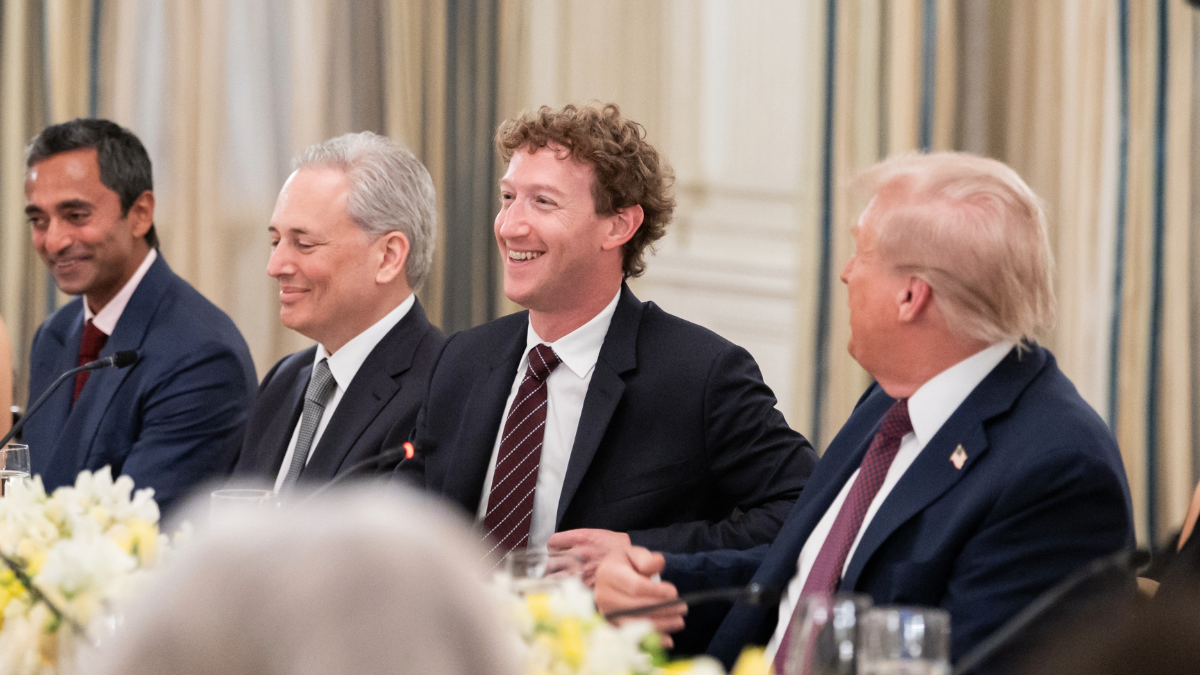Why Europe’s Resistance to Big Tech Matters for the Future of Democracy
Courtney C. Radsch / Oct 22, 2025This piece is part of the "Ideas for Europe’s Future" series by Tech Policy Press. Read more about the series here.

US President Donald Trump and First Lady Melania Trump hosted business and technology leaders, including Meta founder and CEO Mark Zuckerberg, for a dinner in State Dining Room at the White House on Thursday, September 4, 2025. (Official White House Photo by Andrea Hanks)
Over the past several years, Europe has enacted a set of laws, regulations and antitrust remedies intended to bolster democratic oversight and accountability, compliance and competition, and ultimately the health of its information ecosystems by redressing the outsized power of very large online platforms (VLOPs). Over the past year, the United States government and dominant tech firms launched a campaign to undermine digital legislation in Europe, equating regulation with censorship to protect American dominance while undermining the democratic sovereignty of its allies.
This campaign targets the Digital Services Act (DSA) and Digital Markets Act (DMA) as well as other laws that apply to the very largest digital platforms. The administration has inaccurately portrayed these laws as "foreign censorship" and "taxes on American firms.” These attacks appear designed to achieve three main objectives:
- To protect US tech platforms from public oversight and accountability;
- To weaken European sovereignty; and
- To clear the way for extremist parties and those who directly oppose liberal democracy
The scale and scope of this interference is unprecedented: The US House Judiciary Committee issued subpoenas to major tech platforms demanding their communications with European governments regarding compliance with EU law. The chair sent a letter to European officials demanding an end to "foreign censorship," and last month they held a public hearing giving critics of EU and UK regulation – including Big Tech-funded lobbyists – a platform to air their grievances.
The White House has explicitly and repeatedly threatened tariff retaliation against European nations that dare to regulate American tech companies operating in their jurisdictions.
The Secretary of State announced a new policy restricting visas for foreign officials and their families involved in “censoring Americans” and published an official memo disparaging Europe’s “Orwellian content moderation” and its impact on the “free speech rights of American citizens and companies.”
The Secretary also reportedly instructed US diplomats to launch a concerted attack on the DSA while President Trump promised “consequences” for “Countries that attack our incredible American Tech Companies,” claiming that “Digital Taxes, Digital Services Legislation, and Digital Markets Regulations are all designed to harm, or discriminate against, American Technology.”
Vice President JD Vance has used high-profile diplomatic fora to attack European digital governance, declaring that the greatest threat facing Europe was not external adversaries (despite the war in Ukraine) but its own democratic institutions, calling EU officials "commissars" for cracking down on illegal content on social media and characterizing EU privacy protections and AI regulation as "tools for authoritarian censorship.”
But the lack of regulation, the free-for-all that Big Tech’s move-fast-and-break-things ideology promotes, and the failure to rein in the power of Silicon Valley pose the real authoritarian threat to Western democracies. The increasingly cozy relationship between the world’s only superpower and the most powerful tech corporations in the world is creating an unprecedented concentration of power that threatens to undermine the pillars of democracy at home and around the world.
The erosion of European digital sovereignty at the political level is mirrored in the information sphere. The same firms lobbying against European regulation deploy algorithms, moderation systems, and AI tools that manipulate public discourse and suppress dissenting or inconvenient voices.
The future of democracy is inseparable from power. Concentration of power undermines democratic governance, human liberty and agency, and pluralism. It degrades and deforms information ecosystems, throwing them out of balance and enabling manipulation and instrumentalization by those who wield power. Nowhere is this more evident than in the ability of dominant platforms to manipulate and distort what people can see and say on social media, chatbots, app stores, and search engines. The market dominance and lack of legal regulatory oversight, combined with deepening political alliances with populist authoritarian leaders, have resulted in a dangerous level of unaccountable power that can tilt entire political systems.
On X, we’ve watched algorithms systematically amplify extremist and far-right content, from disproportionately boosting far-right parties in German elections to spreading racist falsehoods that fueled xenophobia in the UK following a mass stabbing. Elon Musk has personally intervened to amplify voices he favors and censor those he opposes, massively amplifying their reach. He’s even manipulated the Grok chatbot to promote Trumpism, white genocide myths, and pro-Nazi talking points. In Brazil, Musk refused to comply with court orders related to content moderation on X and accused the judge of censorship. This is billionaire-driven propaganda and platform manipulation that seeks to undermine liberal democracy.
And Musk is not alone.
TikTok has reportedly boosted far-right candidates in Romania and Germany, suppressed content critical of Trump in the US, and removed content unwelcome in Beijing. Now it looks set to be controlled by a coalition of pro-Trump billionaires, including media mogul and Oracle co-founder Larry Ellison.
Meta and Google are no different. Facebook illegally downranked politicians’ posts, as a Belgian court confirmed. Instagram concealed hashtags related to Democrats during the US elections. Google has blocked AI searches for Trump and dementia. YouTube’s recommender system has long fueled extremism, steering users toward conspiracy theories and far-right propaganda while penalizing and demonetizing journalists – including independent Russian and Ukrainian media—and LGBTQ content. Meanwhile, across platforms and especially Meta, peaceful expressions of support for Palestinians amid the genocide in Gaza have been censored at scale, both on their own accord and under pressure from the Israeli government.
The business models of Google, Meta, X, and TikTok depend on surveillance and datafication — rendering our behaviors and expression into data and leveraging their algorithmic power to manipulate attention and belief for paying clients. Their vision for omnipresent personalized chatbots mediating how people learn, create, socialize and work risks amplifying today’s already unacceptable levels of corporate control over freedom of thought, speech, and expression to a point that effectively eliminates human autonomy and ultimately the preconditions for liberal democracy.
And their power doesn’t stop at shaping political debate — it extends to dismantling the very institutions that hold them to account, like journalism. For over a decade, platforms have monopolized digital advertising and access to audiences, siphoning revenue and attention from the Fourth Estate and reinforcing their dominance through increasing dependency and intermediation.
Now these tech firms are stripping news content to train their AI systems without consent or compensation, turning the work of reporters into unpaid fuel for the very tools that will replace them while pumping out AI junk that drowns them out.
Corporate retaliation against modest efforts to enforce copyright and remuneration to publishers has become equally systematic. Meta censored news accounts in Australia and Canada when those countries attempted to require fair compensation for the use of publisher content, partly as a warning to Europeans who would do the same. Google has also censored journalism in retaliation against attempts to regulate, conducting "tests" suppressing news content in Europe and California, in what can only be seen as an attempt to intimidate the news industry.
Big Tech extracts content and advertising revenue, inserts itself between publishers and their audiences, and then weakens or punishes any effort to regulate.
What’s at stake isn’t just fairness in the market, but the survival of independent journalism — and with it, the democratic checks that keep concentrated power in line. The result is an information system dominated by platform monopolies that have every incentive to manipulate speech and suppress dissent, including at the behest of rising authoritarian leaders in the US.
***
We are witnessing the fusion of corporate and state power take institutional form. Leading tech executives have been given unprecedented access to government systems and commissioned as lieutenant colonels in the US Army Reserve. Private control over critical digital infrastructure – from social media to satellite communications to AI systems – is allowing a handful of billionaires and their tech platforms to shape information flows, military operations, and even the tools of governance itself. This blurring of public and private roles, absent real oversight or democratic consent, marks a dangerous normalization of a world where those who build the machinery of surveillance and persuasion now help decide how—and against whom—it is deployed.
This control and manipulation over our information ecosystems isn’t just ‘algorithmic bias.’ It’s a function of market dominance and unaccountable interference in core democratic processes. It’s a system where a handful of unaccountable tech executives decide which voices live and which voices die online. They are not neutral hosts; they are political actors with extraordinary power to distort the public sphere and undermine democracy in the United States and around the world.
These statements, actions, and manipulation of trade and diplomacy represent a deliberate and disingenuous attempt to delegitimize European democratic decision-making and enforcement to benefit American corporate power. Amid the failure to regulate its own tech firms, the US must not be allowed to undermine European efforts to regain sovereignty over their information systems and resist domination by foreign tech firms. We will all lose if Europe fails.
Courtney Radsch serves on the Tech Policy Press board.
Authors
